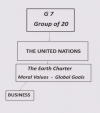Global Religion: Global Partnerships. (1) Businesses.
The G 20 has empowered the United Nations to link and partner with these different areas of our society –
These goals and objectives (the sustainable Development Goals, SDG`s) are being monitored by the UN right down to the local level. Let`s look at how businesses respond.
Goal 12: to ensure sustainable consumption and production patterns.
Governments are to enforce policies and regulations that support sustainable procurement policies among other things. This means that businesses are to promote recycling of products and to care for and not to deplete resources.
Here are some examples from products we buy.
Cadbury – The Cocoa life program aims to improve the livelihoods of farming communities and the landscapes where cocoa grows.
Nestle (Milo drink) – committed to making our packaging recyclable or reusable by 2025.
Nerada Tea – is Rainforest Alliance certified which means we have been audited to meet the strict standards that require environmental, social and economic stability.
Package from Baker`s Delight – recyclable and compostable and sourced from sustainable forests.
Knitpro (knitting needle) – All Knitpro products are produced in eco-compliant facilities, that use renewable energy and maintain international health and safety guidelines.
We, (believers in the Body of Christ) should manage resources responsibly, but we do not need to adopt the UN's SDGs or their earth-based ideology.

The G 20 has empowered the United Nations to link and partner with these different areas of our society –
- Government, civil, businesses, non-government, (charities, foundations, community based and religious organizations.)
These goals and objectives (the sustainable Development Goals, SDG`s) are being monitored by the UN right down to the local level. Let`s look at how businesses respond.
Goal 12: to ensure sustainable consumption and production patterns.
Governments are to enforce policies and regulations that support sustainable procurement policies among other things. This means that businesses are to promote recycling of products and to care for and not to deplete resources.
Here are some examples from products we buy.
Cadbury – The Cocoa life program aims to improve the livelihoods of farming communities and the landscapes where cocoa grows.
Nestle (Milo drink) – committed to making our packaging recyclable or reusable by 2025.
Nerada Tea – is Rainforest Alliance certified which means we have been audited to meet the strict standards that require environmental, social and economic stability.
Package from Baker`s Delight – recyclable and compostable and sourced from sustainable forests.
Knitpro (knitting needle) – All Knitpro products are produced in eco-compliant facilities, that use renewable energy and maintain international health and safety guidelines.
We, (believers in the Body of Christ) should manage resources responsibly, but we do not need to adopt the UN's SDGs or their earth-based ideology.

